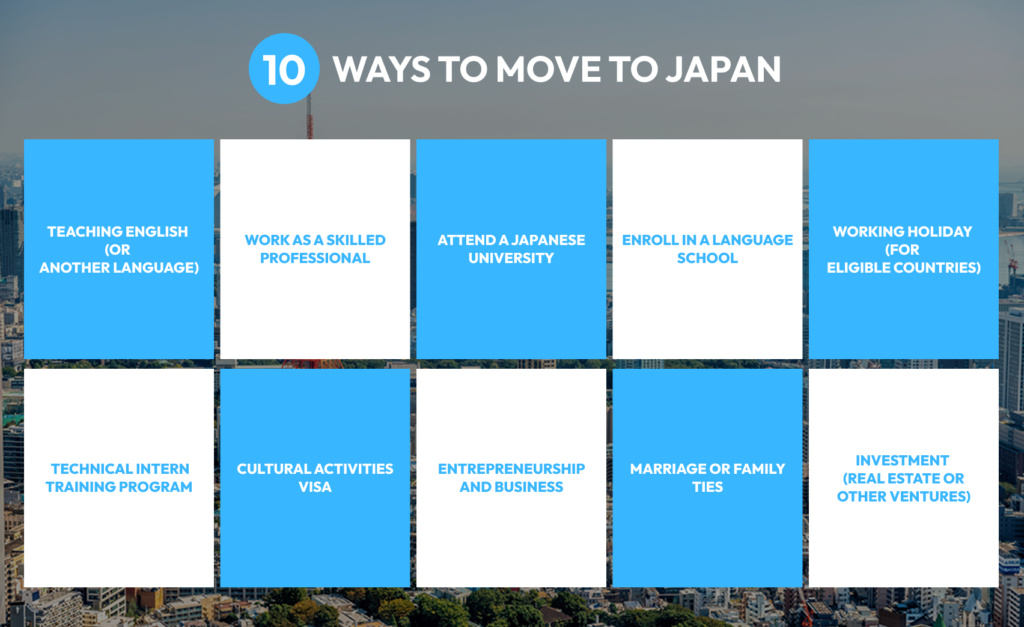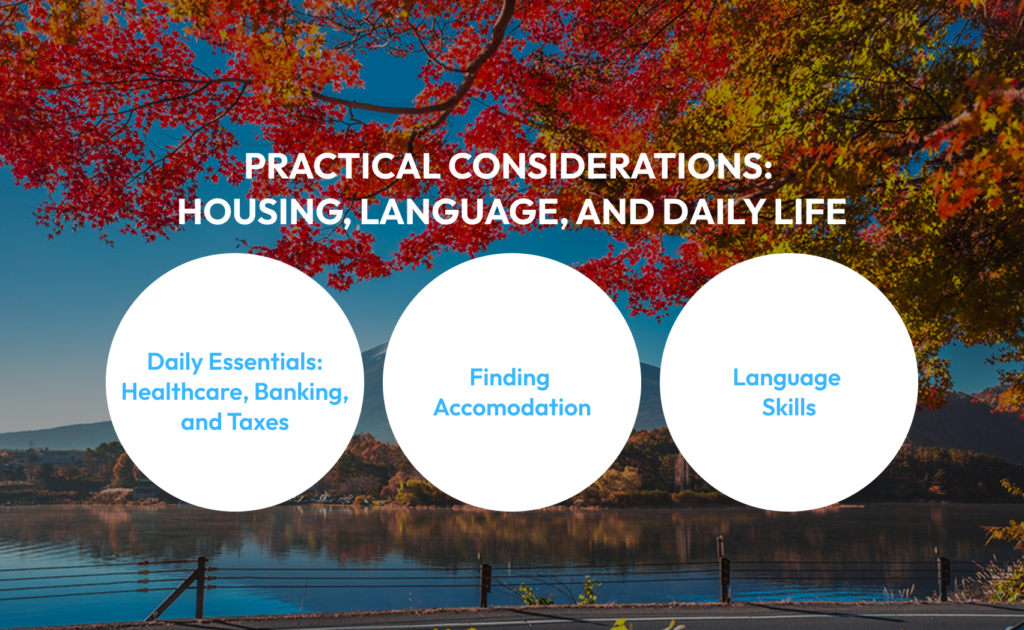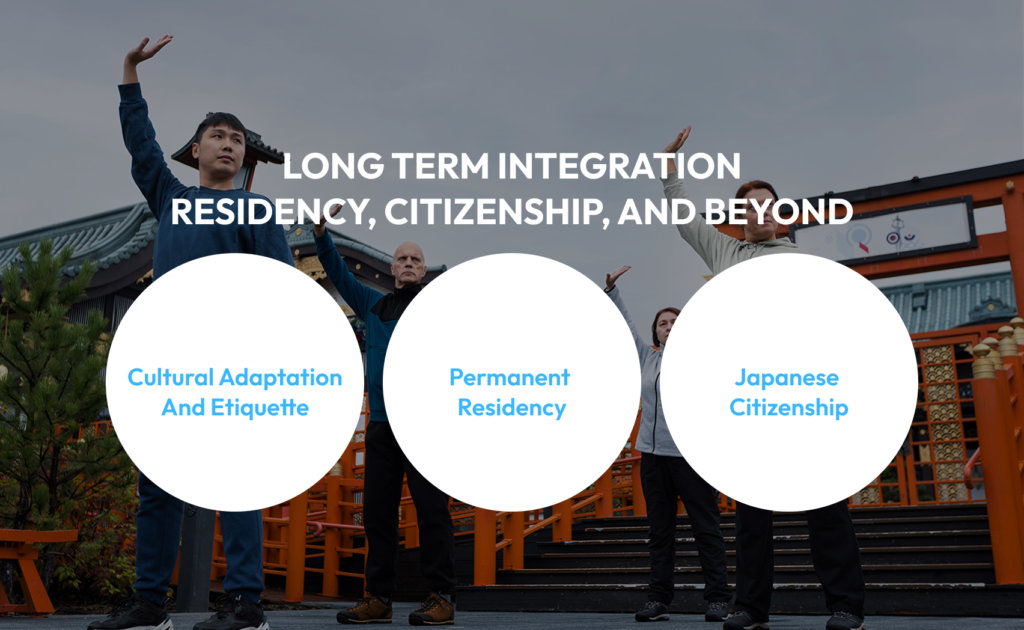How to Move to Japan: Practical Paths to Long-Term Living
Japan can seem like a world that seamlessly blends centuries-old traditions with modern convenience, but there are still a number of practical matters that must be addressed before you move here. Rather than simply focusing on visas, this guide explores practicalities — from teaching and studying to entrepreneurship and cultural activities — that will suit different life goals. By understanding these different avenues, you can navigate the complexities of documentation, the cost of living, and cultural norms, until you find the path that best aligns with your ambitions.
Note: Immigration policies and visa requirements are subject to change. Always verify the latest information on official government websites, such as the Immigration Services Agency of Japan or the Ministry of Justice.
Preparing for Your Move

Before diving into the specifics of each path, it’s important to clarify what you want to achieve in Japan. Are you looking to immerse yourself in the country during the course of a few years of study, gain professional experience, or settle down permanently? Having clear priorities will help you choose the approach that best fits your personal, professional, and financial circumstances, whether it be becoming an English teacher, attending a Japanese university, or starting a business.
1. Clarifying Your Purpose and Timeline
Start by determining how long you intend to stay and why. Some people arrive with short-term goals, such as improving their Japanese language skills, while others see Japan as a place to settle permanently. This is crucial to understanding what visa you require, the amount of money you need to save, and potential regions of Japan to consider.
2. Budgeting and Cost Estimates
Japan’s cost of living varies by location. Major cities like Tokyo command higher rents, while smaller locations outside of urban sprawls are often more affordable. It’s wise to save enough to cover several months of living expenses — rent, utilities, food, and transportation — to ease your transition. (See our related article, “How much does it cost to live in Japan,” for detailed budget examples.)
Ten Ways to Move to Japan

In this section, we explore ten different paths to help you establish your life in Japan. Some focus on work, others on study or cultural exchange. Each has its own set of visa requirements, financial considerations, and lifestyle implications.
1. Teaching English (or Another Language)
For many newcomers, teaching English is one of the most straightforward ways to enter Japan. With a bachelor’s degree and fluency in English, you can often secure a job and a work visa before arrival. Some schools will provide orientation and support with housing, which will ease your adjustment. If you’re fluent in other languages (e.g., French or Spanish), there may also be opportunities at international schools or language institutes. Though these are less in demand outside of areas like Tokyo, you may be able to negotiate for higher wages as a result.
2. Work as a Skilled Professional
Professionals in IT, finance, engineering, and other specialized fields are in demand in Japan’s increasingly globalized economy. Many Japanese companies value international talent, and may sponsor your visa. This route offers a clear career track and could mean higher earning potential in the long-term.
3. Attend a Japanese University
Studying at a Japanese university is ideal if you want a formal education and a deep cultural immersion in Japan. You’ll gain access to career fairs, internships, and university networks that can lead to job opportunities post-graduation. Scholarships are available for international students, helping to offset tuition and living costs.
4. Enroll in a Language School
If your main goal is to learn Japanese intensively, a language school might suit you better than a full university program. Language schools offer visa sponsorships, allowing you to focus on mastering the language for daily life or future career prospects. This path often serves as a springboard to further studies or local employment.
5. Working Holiday (For Eligible Countries)
Citizens of certain countries (e.g., Australia, Canada, New Zealand, the UK, and others) may qualify for a Working Holiday Visa, which allows you to live and work in Japan for up to one year (or, in some cases, 18 months). This is an excellent way to experience life in Japan without the long-term commitment of a work contract or full academic program.
6. Technical Intern Training Program
For those in industries like manufacturing, agriculture, or caregiving, the Technical Intern Training Program provides a pathway to work and train in Japan. While the primary aim is skills transfer, many participants use it as a stepping stone to longer-term employment or transferring to other visa categories.
7. Cultural Activities Visa
If you plan to study traditional Japanese arts, music, martial arts, or other cultural pursuits, a Cultural Activities Visa allows you to stay in Japan for a designated period. This option is perfect for those who want a deeply immersive cultural experience without the constraints of a typical work or student visa.
8. Entrepreneurship and Business
For those with sufficient capital and an entrepreneurial spirit, Japan’s startup ecosystem presents opportunities to establish a business abroad. Some municipalities offer startup visas to help you get settled. Once you meet certain requirements — such as securing office space and initial funding — you can apply for a Business Manager Visa. Though challenging, this route can yield substantial rewards, from professional independence to long-term residency.
9. Marriage or Family Ties
Marriage to a Japanese national or having close family in Japan can offer more flexible visa options, allowing you to work without the limitations imposed on other visas. The same goes for those with Japanese ancestry under certain conditions. While this path is more about personal or ancestral connections, it does offer the chance to remain in Japan for the long term.
10. Investment (Real Estate or Other Ventures)
Aside from starting a company, some individuals explore living in Japan through significant investments in local businesses or real estate. While there is no direct “investor visa” as there is in some other countries, demonstrating substantial economic engagement may strengthen your case for certain long-term stays or business management visas.
Practical Considerations: Housing, Language, and Daily Life

Moving to Japan is more than just securing a visa. From finding a place to live to handling day-to-day logistics, you’ll face practical challenges that will need you to show resilience and practicality.
1. Daily Essentials: Healthcare, Banking, and Taxes
Register at your local city hall as soon as you can after arriving. You will need to bring your residence card (initially given to you at the airport) to have your address listed on it. If necessary, you will also need to register for national health insurance and the natiobnal pension. You’ll also want to open a bank account and learn how taxes work in Japan, especially if you plan to stay long-term. Handling these administrative tasks early on allows you to focus on your career, studies, and social connections.
2. Finding Accomodation
Navigating Japan’s housing market often involves real estate agencies, guarantors, and “key money.” If you’re new to the country or short on language skills, starting in a share house or short-term rental can simplify the process. Over time, improving your Japanese will make it easier to secure long-term housing that fits your budget and location preferences.
While many people manage in big cities with limited Japanese, even basic proficiency dramatically enriches your daily life. Simple greetings, ordering food, or reading train signs all become easier with practice. Consider online classes, language apps, or local conversation clubs before arrival, then join local schools or language exchange groups once you’re settled.
3. Language Skills
While many people manage in big cities with limited Japanese, even basic proficiency dramatically enriches your daily life. Simple greetings, ordering food, or reading train signs all become easier with practice. Consider online classes, language apps, or local conversation clubs before arrival, then join local schools or language exchange groups once you’re settled.
Long-Term Integration: Residency, Citizenship, and Beyond

Once you’ve finished with the basics, you may consider deeper integration — this might one day include applying for permanent residency, or even citizenship. These steps require a solid track record of living in Japan (often several years), financial stability, and in the case of citizenship, Japanese language proficiency.
1. Cultural Adaptation and Etiquette
Daily life in Japan emphasizes respect, harmony, and consideration for others. Over time, small habits — removing your shoes at the entrance, handling business cards properly, and speaking quietly on trains — become second nature. Embracing these customs leads to more positive interactions and a sense of belonging.
2. Permanent Residency
After living in Japan for a certain number of years (generally ten, though it can be fewer under specific conditions), you may be eligible for permanent residency. This grants more freedom in job selection and removes the hassle of regular visa renewals.
3. Japanese Citizenship
Some long-term residents opt for citizenship, which requires renouncing other nationalities in most cases. The process involves language fluency, a stable income, and demonstrating strong ties to Japan. While this route isn’t for everyone, it provides the highest level of integration and legal security.
Building Your Support Network
Making Japan feel like home goes beyond administrative tasks. Joining expat groups, local clubs, and professional associations can help you build friendships and share advice. Over time, you may shift from one path to another — such as going from a language student to a professional, or from a teaching job to entrepreneurship — as your interests and opportunities evolve, but it is always good to maintain networks and friendships.
Final Thoughts
Deciding how to move to Japan depends on your goals, resources, and future plans. Whether you begin as a teacher, a university student, an entrepreneur, or through family ties, each path offers unique challenges and rewards. Through thorough research, wise budgeting, learning the language, and respecting local customs, you’ll lay the groundwork for a fulfilling life in Japan, and you can turn what might seem like a distant dream into a wonderful reality.

